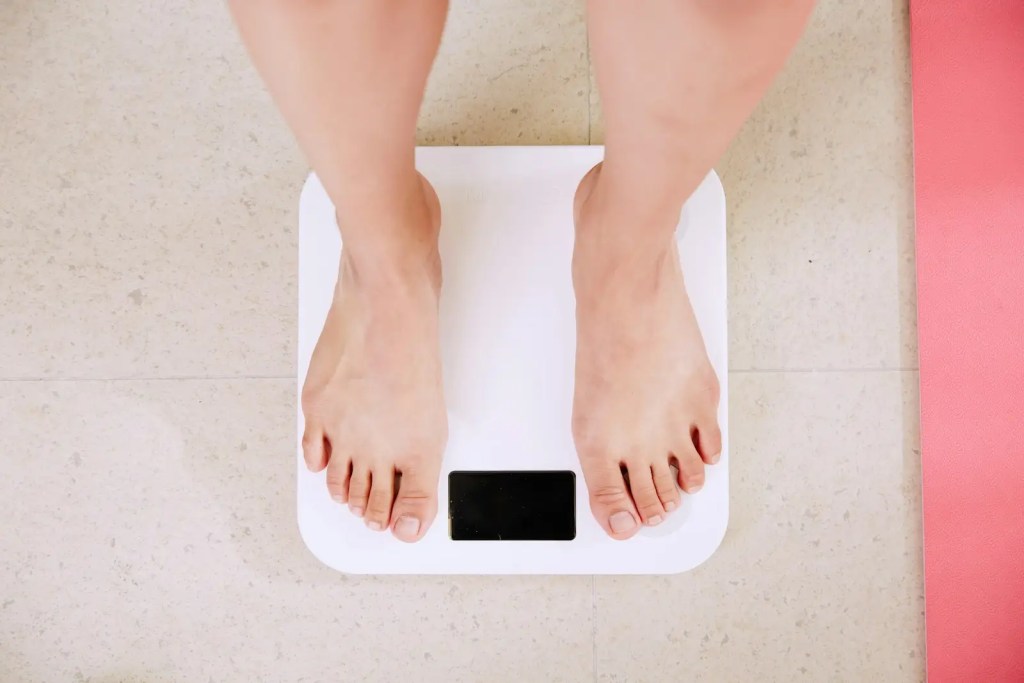This post may contain affiliate links, which means that I may earn a commission if you click on the link, with no cost for you. It’s one of the ways I support my blog. You can read more about this here.
Introduction
Hey there! Welcome, or welcome back! I hope you’re doing well. Today, I want to talk about something that’s all too common on a weight loss journey: Not losing weight despite a calorie deficit.
Have you ever found yourself eating right, counting calories non-stop, and yet, the scale refuses to budge? It’s really annoying, right? You’re doing everything by the book, sticking to your calorie deficit, and still not seeing the results you hoped for.
Well, you’re not alone. A lot of people face this challenge, and it’s more common than you might think. But don’t worry—there’s hope!
In this post, we’ll have a look into some possible reasons why the weight isn’t coming off despite your efforts, and what you can do about it.

Possible Reasons for the Weight Loss Stall
If you’re not losing weight despite a calorie deficit, the chances are…you’re probably not actually in a deficit. It’s easy to miscalculate and overlook certain factors that can throw off your calculations. Some common reasons for this and possible other causes are:
1. Hidden Calories
Let’s start with the sneaky culprits: hidden calories. It’s easy to overlook those small snacks or beverages that we consume throughout the day—a handful of nuts here, a latte there, or a bite of your friend’s dessert.
As an advocate for a small calorie deficit, a few sneaky snacks here and there can quickly add up and sabotage your calorie deficit without you even realising it. (Kline & Pedersen, 2010).
Tips to Accurately Track Food Intake
- Keep a Food Diary: Write down everything you eat and drink, no matter how small. This helps identify patterns and hidden calories.
- Use a Food Scale: Measuring your food can be eye-opening. Portion sizes can be tricky, and what looks like a small portion can actually be quite calorie-dense.
- Drinks Count Too: Don’t forget to track liquid calories. Sodas, juices, and even some coffee drinks can be surprisingly high in calories.

LEARN MORE ABOUT MY WEIGHT LOSS JOURNEY! > How I Lost Over 80lbs: Tips For Starting A Weight Loss Journey
2. Metabolic Adaptation
Our bodies are incredibly adaptive and smart, sometimes to our frustration. When you reduce your calorie intake, your body might respond by slowing down your metabolism to conserve energy.
This phenomenon, known as metabolic adaptation, can make it harder to lose weight over time. (Davies et al., 1989) (Reinhardt et al., 2015)
How This Impacts Weight Loss
- Energy Conservation: Your body might burn fewer calories at rest, making it harder to maintain a calorie deficit.
- Plateau Effect: You might hit a weight loss plateau where your progress stalls despite sticking to your diet.
To counteract this, consider slightly increasing your calorie intake for a short period and include strength training in your routine to build muscle.
3. Inaccurate Tracking
Even the best calorie-counting apps and food labels can have discrepancies. This can lead to unintentional overeating or underestimating your calorie intake. (Del Corral et al., 2009)
Tips for Accurate Tracking
- Double-Check Measurements: Ensure that you’re accurately measuring portions. A tablespoon of peanut butter, for example, can easily turn into two if you’re not careful.
- Cross-Reference Data: Use multiple sources to verify calorie counts. Sometimes, different apps or websites have varying data for the same foods.
- Use a Food Scale: This is especially important for calorie-dense foods. Weighing your food gives you a more precise measure than eyeballing portions.
If you’re tired of swinging between restriction and overeating, there’s a way out. My post on Weight Loss Psychology 101: How to Break the Binge-Restrict Cycle for Good dives into the mindset shifts needed to create a balanced, sustainable approach to food. No more yo-yo dieting—just simple, realistic tips for lasting results!
4. Muscle Gain vs. Fat Loss
Another reason you’re not losing weight despite a calorie deficit? Because you’re gaining muscle!
It’s essential to remember that losing weight and losing fat isn’t always the same thing. If you’ve been incorporating strength training into your routine, you might be gaining muscle, which is a good thing! (Redman et al., 2007)

Understanding the Difference
- Muscle is Denser Than Fat: Muscle takes up less space than fat, so even if the scale isn’t moving much, you might be losing inches and looking leaner.
- Focus on Body Composition: Pay attention to how your clothes fit and consider taking body measurements. These can be better indicators of progress than the scale alone.
5. Stress and Sleep
Stress and lack of sleep can wreak havoc on your weight. When you’re stressed, your body produces cortisol, a hormone that can lead to weight gain, especially around your abdomen.
Similarly, not getting enough sleep can affect your hunger hormones, making you feel hungrier and less satisfied after meals. (Deighton et al., 2014)
Tips for Managing Stress and Improving Sleep
- Stress Management: Try including relaxation techniques like deep breathing, meditation, or yoga into your daily routine.
- Sleep Hygiene: Aim for 7-9 hours of quality sleep per night. Create a calming bedtime routine, keep your bedroom cool and dark, and avoid screens before bed.

6. Medical Conditions
Lastly, it’s important to acknowledge that certain medical conditions can impact weight loss. Conditions like hypothyroidism or polycystic ovary syndrome (PCOS) can make it more challenging to lose weight, even with a calorie deficit.
Consult with a Healthcare Professional
- Get a Check-Up: If you suspect a medical condition might be affecting your weight loss, schedule an appointment with your doctor.
- Follow Professional Advice: Your healthcare provider can offer guidance tailored to your specific needs and may recommend treatments or lifestyle adjustments to help manage your condition.
Practical Tips and Solutions
Revamp Your Routine
- Incorporate Different Exercises: Try adding a variety of workouts to your routine. If you’ve been focusing mainly on cardio, include strength training, HIIT (High-Intensity Interval Training), or even activities like yoga or pilates.
- Change the Intensity: Increase the intensity or duration of your workouts gradually. For instance, add a few more minutes to your run or use heavier weights during strength training.
- Consistency is Key: Stick to your new routine consistently. Remember, changes won’t happen overnight, but persistence pays off.
- Be Patient: Understand that your body needs time to adjust and respond to new workouts. Trust the process and stay committed.
Mindful Eating
Eating mindfully can be a game-changer in managing your calorie intake and avoiding overeating. It’s about being present and fully enjoying your meals, which can help you know when you’re truly full.
Tips for Mindful Eating
- Slow Down: Take your time to chew and savour each bite. This not only aids digestion but also gives your brain time to register that you’re full.
- Eliminate Distractions: Avoid eating while watching TV or working. Focus solely on your meal to better appreciate the flavours and textures.
- Listen to Your Body: Pay attention to hunger and fullness cues. Eat when you’re hungry and stop when you’re satisfied, not stuffed.
- Enjoy the Experience: Make mealtimes enjoyable by creating a pleasant environment. Set the table nicely and sit down to eat, even if it’s just a snack.

Stay Hydrated
Hydration plays a big role in overall health and weight management. Sometimes, our bodies can mistake thirst for hunger, leading to unnecessary snacking.
Tips to Stay Hydrated
- Drink Plenty of Water: Aim for at least 8 glasses (64 ounces) of water a day. Your needs might vary based on activity level, climate, and individual health.
- Carry a Water Bottle: Keep a reusable water bottle with you throughout the day to remind yourself to drink regularly.
- Infuse Your Water: If plain water is too boring, add some squash to make it more appealing.
- Drink Before Meals: Drinking a glass of water before meals can help you feel fuller and prevent overeating.
Staying Positive and Motivated
Celebrate Non-Scale Victories
When the scale isn’t moving, it’s easy to feel discouraged. However, weight is just one measure of progress. There are so many other victories worth celebrating on your journey to better health.

Focus on Other Signs of Progress
- Clothes Fitting Better: Notice how your clothes fit. Sometimes, even if the scale doesn’t show a drop, your body composition might be changing, and your clothes start to feel looser.
- Increased Energy Levels: Pay attention to how you feel throughout the day. Are you more energetic and less sluggish? That’s a big win!
- Improved Fitness: Celebrate improvements in your fitness level. Maybe you can run longer, lift heavier weights, or recover faster from workouts.
- Better Mood and Mental Health: Exercise and a healthy diet can significantly boost your mood and mental health. Feeling happier and more balanced is a fantastic non-scale victory.
I hit a few plateaus during my fitness journey. It was always incredibly frustrating, and I would begin to doubt myself. So I would try to focus on how much fitter I was getting, or stronger.
These small wins kept me motivated and reminded me that progress isn’t always reflected on the scale.
Building a Support System
Having a strong support system can make a world of difference when you’re striving to reach your health goals. Surrounding yourself with supportive friends, family, or even online communities can give you encouragement, accountability, and motivation.

Tips for Building a Support System
- Lean on Friends and Family: Share your goals with your family and friends. Let them know how they can support you, whether it’s joining you for a workout, encouraging healthy eating, or simply being a positive voice.
- Join Groups or Forums: There are many online communities where people share their weight loss journeys, offer tips, and encourage. Platforms like Reddit, Facebook groups, or fitness apps have supportive forums where you can connect with others facing similar challenges.
- Find a Workout Buddy: Having someone to exercise with can make your workouts more enjoyable and keep you accountable. Plus, it’s a great way to bond and share progress.
- Consider Professional Support: If you feel stuck, seeking help from a nutritionist, personal trainer, or therapist can provide personalized guidance and support tailored to your needs.
Not Losing Weight Despite a Calorie Deficit: Conclusion
There are a number of reasons why you’re not losing weight despite a calorie deficit. It’s essential to know that everyone’s weight loss journey is unique.
What works for one person might not work for another, and that’s perfectly okay! Patience is key. Celebrate every small victory, stay consistent with your efforts, and don’t be too hard on yourself.
Believe in your progress and keep moving forward. Every step you take is a step closer to your goals. Stay positive, stay motivated, and remember—you’ve got this!
I’d love to hear from you! Share your experiences, tips, and challenges in the comments below. Do you have any specific concerns or need further advice? Don’t hesitate to ask—I’m here to help.
If you enjoyed this post and want more tips and support on your journey, make sure to subscribe to the blog. Together, we can achieve our health goals and support each other along the way. Let’s keep going strong!

